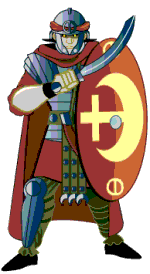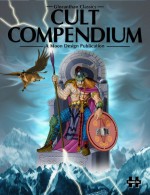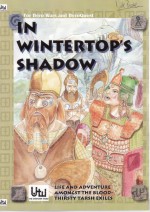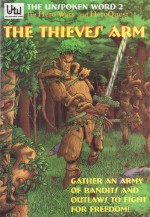
Products!
From the RuneQuest Digest, 19 September 1993:
Ken Rolston wrote:
I've been wondering about the nature of faith in Glorantha.
That's you and me both, then.
Since the gods are manifest -- or at least as inferentially empirical as lots of modern physics -- there is no issue of faith in the existence of gods.
Orthodox Malkioni would probably tell you that they aren't "gods" but "demons" or "personifications of natural forces", but that's splitting hairs -- a traditional monotheist occupation.
One to throw into the discussion: do some Malkioni think that if enough people are afraid of a thing, it becomes personified as a communal spirit? They would then see fear, ignorance and doubt at the root of all non- Malkioni religion. Brithini speak of the Golden Age as the "Kingdom of Logic" -- maybe the Malkioni talk about the "Kingdom of Faith" instead, a bygone age when everyone believed in God and nobody had any doubts ('til that nasty Vadel put out the Light of Faith and began the Age of Doubt).
That is to say, does "personification" have a precise, literal meaning to a Malkioni theorist? That the ignorant savage can actually make "gods" out of natural forces, either by fearing or by feeding them?
The issue of faith in Glorantha is -- are the gods telling the truth?
That's certainly one of the issues of faith. Given that one of the oldest myths of Glorantha tells us that can be no such thing as One Truth in the world any more (How Uleria Adopted the Boggles - relevant text below), I'd split this two ways:
1) Do the worshippers know what they're committing themselves to when they start to worship a god? This is the 'reluctant Humakti' question from Wooden Sword days (text below): are the worshippers aware of what their god approves of and will require of them when the chips are down / when push comes to shove / at the crunch?
A while ago someone posted a Babeester Gor ritual to this list where loads of innocent victims were slaughtered. The author cravenly said, "Of course, this doesn't really happen," thus invalidating the whole religious experience! If you join B.G., some time you'll have to ask yourself whether you approve of butchering healers who heal your foes. If you don't, that's a 'crisis of faith'.
Of course, as in the Real World, cults don't tell prospective members about the 'down-side' until it's too late to back out... and people born into a cult are the last to recognise its nasty side.
2) Is the god they worship what they think it is, or is it a 'front' for something else? As in Henk's God Learners with their innocent dupes, or the "Argrath's Saga" view of the Lunar Empire as a front for the Devil. Also, there's the prospect of parasitical spirit cults, Tricksters, chaotics under false colours, et cetera.
Also, leaving the god out of it for the moment, what about the cult itself as an organisation? Are the aims (religious and/or political) of your cult leaders compatible with those of their worshippers? Consider the Orlanthi fear of Lokmaydism (named after Lokamayadon, the Highest Priest of the Air Gods for Dorastor in Nysalor's Bright Empire):
Lokmaydism is chaotic, which is the reformation of both society and cult around an individual for his own aggrandisement.
I think we could all name a few Rune Lords and High Priests (whether player characters or no) with more than a slight leaning in this direction. But what do you do if your leaders are taking you a way you don't want to go? Defy them? Leave the region? Leave the cult? Sounds like another 'crisis of faith' to me.
And, chucking aside all the divine aspects, often a RuneQuest 'cult' stands in for what would be a largely or completely mundane organisation in our world. Thus the Lunar Army includes a cluster of phalanx-cults worshipping their standards (as the Romans did), and deriving their Shield Wall and Standfast spells from their membership in the regimental religion. But I'm sure mutinies still happen. Both Orlanthi kingship and Yelmic imperial rule are political and religious institution: defying the ruler is ipso facto defying Orlanth Rex / Yelm Imperator. But rebellions and treachery still happen. That old truism, "treason never doth prosper...", would have to apply to heresy as well in Glorantha: for the two go hand in glove.
Nick says: don't try to talk about the actions and motivations of 'gods' and 'cults' as if they existed independent of society and politics.
Also, in tolerant polytheistic Gloranthan societies, there is also the issue of faith in the moral goodness of the god -- that is, not just whether you accept his commandments and myths as truth, but whether you "prefer" a god's moral vision enough to become his initiate.
Hang on a minute: by a 'polytheistic Gloranthan society', are we talking about, say, a Sartarite town with its Orlanthi, Ernaldan and Lightbringer temples, or Pavis with its mish-mash of foreign cults, or the Lunar Empire where the state cults range from philosophies to career-paths? The three would have very different criteria: a Lunar Yuppie would make his choice of cult for reasons that were utterly alien to a Sartarite townsman (the Pavis setting is so artificial that I will not spend any time considering how it might be made to function).
Given the spirits of retribution of cults, it appears that choosing a different god than the one you were born has a modest, though significant, personal cost. Is it significant for a Gloranthan character's story when we learn he has, for example, forsaken the worship of Orlanth for Chalana Arroy? Or, more dramatically, when he foresakes the worship of Orlanth for Seven Mothers?
I don't believe you have to 'forsake' Orlanth for Chalana Arroy. The two cults are associates, and per Cults of Prax p.9:
The Spirit of Reprisal, or Retribution, is a common feature to most cults. This is a spirit, monster or curse which falls upon initiates who quit the worship of their deity ... These reprisal spirits do not, of course, come into action when initiates transfer to an associate cult.
As an Orlanthi, I think joining the Moonies has much the same stigma in Glorantha as it does here: weird cultists preaching nonsense on street corners, handing out mind-altering red berries, all of them certifiably insane (accepting an Insanity zap is one of the Seven Mothers' initiation rites, we fondly believe). Plus, you're usually selling out to the evil occupying Empire: 'tis vertical collaboration, admittedly, but none the better for that.
(Note that here in Greydog Lands, there's a growing belief that the Seven Mothers cult can somehow intercede between an apostate and his former religion's spirits of reprisal. Otherwise quisling Lunar converts will all look like flea-ridden ex-boxers, which is empirically untrue.)
In a recent posting re: Donald Wilton's cry of "What do I get out of it?", I tried to list some of the mundane "significant personal costs" incurred by changing your religion, and to give a 'feel' for why characters might prefer one cult to another. The flaw of a cult-centred approach is that it ignores the social dimension of a character's life. Religion -- the Latin means "binding together" -- is inherently a social construct: it should not be possible to consider cult and cultists in vacuo, as if they were the only factors involved.
I feel I have no real sense of the religious feeling attached to the Gloranthan cults.
The old Roman motto probably applies to most cults: DO UT DES, "I'm giving to you so you'll give to me". There is usually a strong element of quid pro quo in a cultist's dealings with his deity; this may indeed be a universal feature, given the (supposed) existence of the Great Compromise. When I make sacrifices, I do it SO THAT my god will look out for me (whether by divine intervention, provision of Runepower, or whatever it may be). It can be hard to split out the work a worshipper does for his cult from that required by his god: consider the Lunar Army's drills and campaigns.
Added to this, we usually find some identification with deities, either as culture heroes or as exemplars of a particular career path. (One thing not covered by any RuneQuest cult to date is the evolution through initiation to "different gods" that must take place in many normal characters' lives: from Voria to Ernalda to Asrelia for women, from a boys' god [Voriof?] to Orlanth for men. Like Yelm, but with different gods for different stages. This obviously happens, but has never been mechanically described).
Orlanthi feel it as both religious and 'normal' for them to run and shout, feast and fight -- it's what their god wants. Sullen, morose Orlanthi who don't have many friends may join a different cult (Lhankor Mhy? Storm Bull? Humakt?) in order to find some other form of companionship. Again, this is as much a personal and social as it is a religious 'vocation'.
Certainly part of the problem is not knowing polytheism firsthand.
I don't think there has ever been a Real World equivalent to Gloranthan 'poly-pantheonism': the ability to choose your gods from interacting and overlapping pantheons. I also think the 'umbrella' nature of cultures' ruling gods is not adequately shown in the written RuneQuest rules (though it comes out quite clearly in sources like King of Sartar and What My Father Told Me): the fact that almost all Orlanthi men worship Orlanth AND (perhaps) some other god, almost all Praxian men worship Waha AND (often) some other spirits or gods; etc. A better presentation of this aspect of religion would contribute greatly to our knowledge of what "polytheism" within each culture amounted to.
Another is my sense that, since the cult is a game mechanic, it is insufficiently fleshed out to provide a guide to a common person's interest in participation in a cult's myths, prescriptions, and activities.
Too true. A partial solution would be to examine existing cult write-ups to ask, not "What does the initiate get from/give to his cult?", but instead "What does the initiate get from/give to society by being in the cult?" Cult ecology writ large.
But what's this about a "common person"? You can't very easily be a 'casual Humakti', a 'part-time Chalana Arroy', etc. Those are vocations, where the cult support is backed by society at large. Consider, say, the Celtic bards as a 'cult': the institution defined an individual's role and had its own traditions and lore which were mostly irrelevant to society at large, but also had a bevy of customs to regulate interaction between the 'bardic initiate' and the normal world.
We find the same in several Gloranthan instances: Lhankor Mhy research and apprenticeship, Chalana Arroy payment customs. But these are the usual regions where the "common person" will interact with the cult. As noted on KoS p.246 (I can cite this now without looking it up!), any other cultists are seen as "eccentric, strange, exotic, or dangerous": nothing to do with us "common people". We just don't need or want to know about the myths and traditions of these peculiar cults -- especially if they downplay, devalue or contradict our own!
I note also that I am prejudiced against heroic roleplaying by inclination. My characters and campaigns are uniformly low-level and focused on everyday folk (hobbits, if you will) caught up in the affairs of the Big People. I admire the flavor of epic mythic speculation occasioned by the Gloranthan setting, but it rarely has much bearing on the things going on in my gaming world.
Hooray! Another man who can appreciate the true value of a healthy cow, a loving wife, and a warm pint of King's Ale! "HeroQuesting" is for social inadequates: Real Men stay home and live the way God meant us to, in the company of good friends (except when we go and beat up our neighbours). And the only good foreigner is (usually) a dead foreigner.
Cheers,
Nick
Sources Referred To:
from "HOW ULERIA ADOPTED THE BOGGLES", WF 5 p.29
ORENOAR stepped forth and thrust her burning torch of Truth upon the nest of the Boggles. They gnawed at it like termites and darkmoths, riddling it with questions until the torch was dashed to pieces. Though the torch was relit, we mortals today see only the many lesser versions of the original Truth, rather than the one which the Boggles did not touch.
For further details, see the Prosopaedia sub. ORENOAR and RATSLAFF.
from "THE FOUNDING OF THE WOODEN SWORD", WF 11 p.13
This same band of warriors was shortly afterwards haunted by bad dreams and clear visions. Humakt was displeased with the tarnish upon his honour. The group, rudely aware of what it means to worship a death god, prepared themselves and set off.
The player character party had previously run from a losing battle: only now do they discover that their god would have preferred them to die well. Hassled by Humakt, they return to what they think will be certain death.
"As you don't exist, you shouldn't be reading this"
-- a Solipsist Heresy curse, found in a God Learner Ms.

Awards!

Issaries, Inc have created Fan Material Required Statements and statements on Granting Credit Properly. This site accepts both. Etyries.com is owned by Nick Brooke, who has moral rights.











